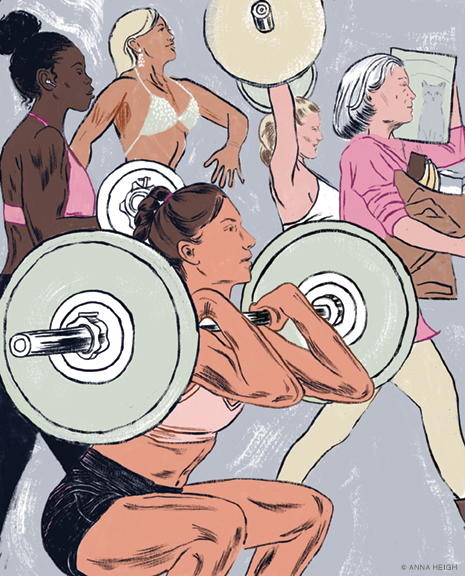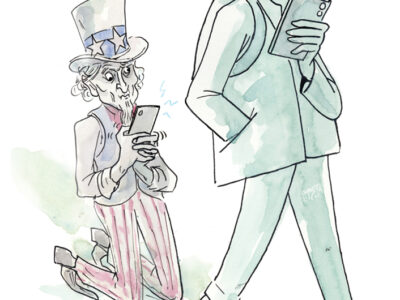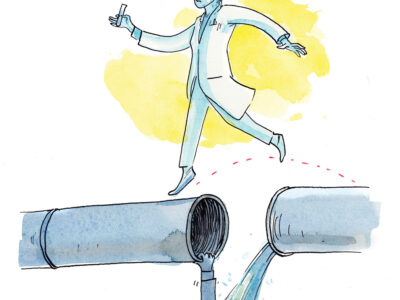
Discovering the benefits of physical power.
By Haley Shapley
I was working on a cultural history of physically strong women when I had the opportunity to travel to Iceland and participate in the Spartan Ultra World Championship. Most of the athletes there were racing for 24 hours, but having no training in either obstacle-course racing or ultramarathons, I signed up for the “sprint” course, a nearly seven-mile loop over unforgiving terrain that included carrying buckets of gravel long distances, sliding down sheets of ice, climbing ropes, hoisting giant sandbags, and much more that I’ve mostly blocked from memory.
Before the race, Spartan founder Joe De Sena explained that he had designed the course to be as difficult as logistics could reasonably support. When he was trying to identify the ideal location for the race, Iceland in December came to mind. “My team came back and said, ‘No, because there’s no light and it’s extremely cold,’” he told me. “And I said, ‘Perfect.’”
His team was not mistaken. The conditions were harsh. But Iceland was also beautiful in the way that only stark landscapes can be. When I crossed the finish line, I had such an immense gratitude for my body and the fact that I have kept it strong. I wasn’t the best, by any means, but without any special training, I did it. My glutes and biceps and quads and abdominals and whatever muscles are in my forearms showed up for me.
Being strong makes life easier and more fun. Because fun is what I had out there, even if it didn’t exactly feel that way when my life flashed before my eyes as a fellow competitor slid uncontrollably down a sheet of ice, narrowly avoiding launching me off the mountain as I swiftly jumped out of the way. “You’re really lucky you have quick reflexes,” he told me, still dazed.
I am lucky to have quick reflexes—although I like to think there was a little skill involved, too—but I’m even more lucky that I grew up when I did, after a lot of hard work by female athletes helped make it possible for me to compete in a race of this kind.
Growing up, I played whatever sport I wanted, without much fear of being considered masculine, which might be why I was so surprised at the reaction when I announced that I planned to enter a bodybuilding contest. My fit fam was excited, wanting to know the details about my training plan and the color of my sparkly bikini. My actual family, on the other hand, was mostly in disbelief.
“Why are you hanging out with those disgusting women?” a relative asked after seeing a photo on social media of me supporting some of my bodybuilding teammates at a show.
Disgusting is a harsh word to describe anyone, and yet people who would never refer to someone who is obese or alarmingly thin as disgusting have no problem hurling that label at women with above-average muscle definition.
When I visited home a few weeks before my show, the commentary shifted from the people I was keeping company with … to me. “You look like a man!” another relative exclaimed. I think it was meant to be a joke, but considering that I still had plenty of fat, at least by bodybuilding standards, objectively this just wasn’t true. But even if I had been leaner or more cut or as flat as a pancake, that wouldn’t have made me any “manlier.”
I was also amazed by how very worried everyone became about my romantic prospects. “But how will you date?,” people would exclaim. Others would say things like, “Wow, look at you! Guys must love your muscles!” or “Don’t get too strong. Men don’t find that attractive.” They’re opposite sentiments, but the common thread running through the commentary was how bodybuilding was affecting my relationship with men.
When I signed on for the competition, how men would perceive me wasn’t a consideration, and I wish society at large didn’t feel the need to frame women’s fitness decisions in the context of how they affect their marriage or child-rearing prospects. We have come so very far, and yet our definitions of womanhood remain somewhat constrained by what a person should look like—and if she doesn’t look that way, she must make up for it somehow.
I struggled with these ideas while training for my show. In the end, I went onstage with five-inch heels, hair extensions, glittering jewelry, false eyelashes, and fake nails, and I smiled and strutted—or tried to, at least. It was so different from who I normally am, and I liked it for that reason. I felt like an actor taking on a role. I also disliked it for that reason. Was playing up an expression of traditionally defined femininity undermining the message I wanted to convey? Were my actions saying, “Hey, a little muscular definition is OK if you still look good in a swimsuit that’s small enough to fit into a sandwich-size Tupperware container”?
For me, bodybuilding was a goal like many other things I’ve done in recent years, including running a marathon, summiting a 14,000-foot mountain, and riding a bike 206 miles. It was hard work, and I did it to prove that I could. I wanted both to be strong and to look strong. While I can’t pretend that the positive comments I received about my appearance while I was training didn’t please me on some level, what touched me the most was when my mom’s cousin, who’d been following my journey unbeknownst to me, showed up to cheer me on. I later found out she was inspired to get into the gym and work toward a pull-up.
My mom’s cousin may have found some inspiration in me, but I found a huge dose of inspiration on my way back from the Spartan Ultra World Championship, on a layover in Chicago. I struck up a conversation with a man sitting near me. “You should meet my wife,” he said. “She’s very strong.”
Fortunately, I got to do just that. Retired businesswoman Edie Edmundson recounted the story of how, at age 75, she stood in the store, staring down a 25-pound bucket of kitty litter. There was a problem: she couldn’t get it into her cart. “I asked a customer to take it down,” she said. “I thought, ‘This is ridiculous. I can’t depend on other people to do simple things for me.’”
Now 82, Edmundson was active growing up and had been the captain of the drill team. But no one back then lifted weights, not even the boys. She never really considered trying it until that wave of frustration came over her in the grocery store.
In a case of serendipitous timing, she won a one-month membership to a CrossFit gym around that same time. She remembers that she couldn’t complete a single sit-up or get off the floor without using a box to pull herself up. She started a program of lifting light weights, and within a couple of weeks, she felt her strength returning. She was able to do sit-ups, and getting off the floor was becoming easier. A year in, she’d lost fat, gained muscle, and felt she looked better in her clothes, although that was just a fringe benefit. “I was starting to feel more energy,” she told me. “I really liked being able to do the day-to-day things better, like pulling a suitcase through an airport and going up and down stairs.”
Once she could lift 25 pounds, she went for 35, and then for 50. On her 81st birthday, she deadlifted 121 pounds, a fact that lit up her face to share. “The body is meant to work, and when it doesn’t work, it gets really lazy,” she said. As much as Edmundson understands the gravitational pull to want to sit (how lovely it is to curl up with a good book), it’s worth it for her to keep moving. She takes no prescribed medication, her bloodwork levels are all perfectly normal, and she’s found a great community through getting stronger. And, of course, that bucket of cat litter is no longer a problem.
We all love to cheer for the US women’s soccer team and watch in awe as Simone Biles does gymnastics, but their level of athletic talent is on another plane. Here is a woman in her eighties proving that you don’t have to possess a superhuman-style capacity in order to benefit from pursuing strength-based goals—you just have to be willing to put in the effort. “I’ve had people who have said, ‘You’re my inspiration,’ and I’ve said, ‘Anybody can do this; it’s just a mindset of getting yourself to the gym,’” Edmundson says. “I don’t think I’m unusual; I think I’m normal. You’re never too old to start.”
Haley Shapley C’06 is the author of Strong Like Her: A Celebration of Rule Breakers, History Makers, and Unstoppable Athletes, from which this essay is adapted. Copyright © 2020 by Haley Shapley. Reprinted by permission of Gallery Books, an imprint of Simon & Schuster, Inc.




